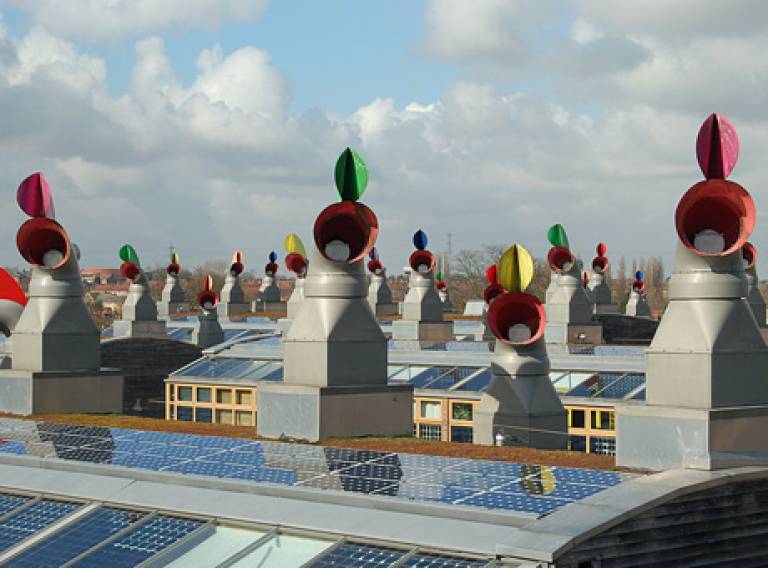Sustainability: Concepts and Materiality workshop
23 May 2012

UCL-Energy PhD student Faye Wade reflects on the 'Sustainability: Concepts and Materiality' workshop on 18th May at which she presented:
What does it mean to be sustainable? What enables or hinders sustainable behaviour? A one day workshop, held on the 18th May and organised through collaboration between UCL Anthropology and the Environment Institute, successfully bought different disciplines together to discuss what sustainability means.
Keynote speaker Blanche Cameron, who amongst other roles is the founding director of RESET-Development, opened the day with a thought provoking discussion of sustainability, particularly our relationship to nature. Blanche argued that we need to move away from our current focus on CO2 emissions and the economy and towards a focus on all aspects of the natural environment, in order the behave in a sustainable way. This really resonated with those attending and was picked up on again at several points throughout the day.
The first papers session on ‘cultural shifts’ raised questions such as at what levels do we need to be active in order to promote sustainability? Should we be acting locally? Can this influence global action? Through a case study of engineering at Arup, Andrew Chilvers (Civil, Environmental and Geomatic Engineering) demonstrated that even those with the best intentions struggle to achieve sustainability in practice, largely due to existing practices and rhetorics restricting their action. Pakhee Kumar (Sustainable Heritage) used a series of examples to illustrate the difficulties in achieving truly sustainable heritage tourism. She raised important questions around who gains from heritage tourism, and how local economies can be affected, not always with equal distribution of access or economic benefits. Katriina Rosengren (LSE), discussed preliminary findings around the extent to which issues of sustainability are addressed within urban planning documentation for several Northern European capital cities. All of the talks offered examples of the different levels at which sustainability is being addressed.
Two sessions of 5 minute PhD presentations included a huge variety of topics which fit under the sustainability umbrella, from domestic heating (Faye Wade, UCL Energy Institute) and ventilation (Carrie Behar, UCL Energy Institute) to the role of adolescents in sustainable consumption (Rebecca Collins, Geography) to disaster resilience (Sneha Krishnan, Civil, Environmental & Geomatic Engineering) and sustainability discourses in the UK materials industry (Sarah Wilkes, Anthropology). The sessions offered an opportunity to reflect on the responsibility of different groups, whether it be adolescents, householders or firms.
The papers in the second half of the day addressed the theme of ‘creative reuse’. Brian Garcia (Bartlett) explored the challenges for implementing public transportation in car dominant cities. He drew nicely on the discussion of different levels of activity with the example of high-speed rail. This may encourage use of public transport and inter-city travel, benefitting regional and national levels, but compromises are made at the local level, with noise and construction issues. Issues of responsibility at different levels were picked up by Henrietta Lynch (UCL Energy Institute/ Bartlett), in her film on the uptake of the Passivhaus standard in the UK. This highlighted problems regarding the supply chain requirements for achieving such a standard in the UK and the skills set of individual installers. Whose responsibility is it to push for such a standard in the UK and ensure that the required infrastructure is in place? Different actors need to align towards the same goal to create this.
Peter Oakley (Anthropology) presented his experiences of the goldworking industry. Peter introduced us to a ‘recycled’ gold company who collect un-wanted gold, melt it down and purify it ready for re-use. Peter pointed out that this has been the industry standard for years; however, it is known as recovery. Can this, therefore, be positioned as sustainable, considering the smelting and refining process is so energy intensive? This raises some important questions around the definitions and meanings behind words such as recycled and sustainable. And are they being put to the correct use?
The day concluded with an engaging round table discussion from Jerome Lewis (Environment Institute) and Victor Buchii (Anthropology) on some of the issues covered. This included discussion around the concept of sustainability; what’s in a word? Is it important to have a concept or term on which to focus our attention? Today has illustrated to me that a term can help in directing people, but it’s extremely important to ensure that it is being used in the correct way. Relating back to Blanche’s opening talk, are we approaching sustainability in the correct way by focusing primarily on CO2 emissions and economic impacts? I don’t think so, but seeing the variety of themes being addressed today suggests we might be heading in the right direction.
 Close
Close

